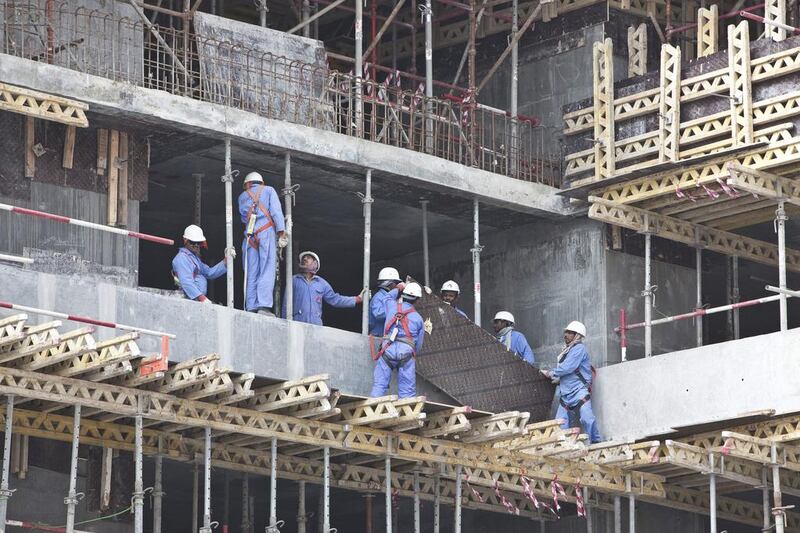ABU DHABI // The number of people killed in falls or being struck by falling objects at work has been reduced by a third.
This has resulted in 352 fewer hospital trauma admissions, reduced emergency department visits by 3,872 and seen first aid cases drop by 48,000, according to the Health Authority Abu Dhabi.
Health experts welcomed the figures but cautioned that it was no time for complacency.
The reduction follows the Height Aware safety programme, which aims to highlight injuries that occur in sectors such as construction, agriculture and the oil and gas industry.
The initiative is not compulsory, but any company with staff who work at height should join in, said Dr Omniyat Al Hajri, the director of public health and policy at Haad.
The health authority said the 32 per cent reduction took place from May 2012 to May 2013. What this means is unclear, since the authority would not give figures for the number of deaths from one year to the next, or explain which figures were being compared.
Nevertheless, Dr Joseph Manna, a consultant and emergency doctor at Sheikh Khalifa Medical City in Abu Dhabi, said: “This is a significant reduction and definitely a move in the right direction.”
Despite the reduction, Dr Manna said there were still too many injuries on work sites.
Workplace accidents are the second-most common cause of emergency cases, after road accidents, he said.
“It is a very close second,” he said.
Soaring temperatures, which can leave workers dehydrated and sometimes delirious, can lead to accidents, as can haste and user error, he said.
Dr Biniam Tesfayohannes, head of the emergency department at Mafraq Hospital in Abu Dhabi, also welcomed the figures.
“It will never be zero as long as there is construction work ongoing but it is a welcome improvement.”
While the figures are pleasing, more can be done, said Dr Tesfayohannes.
Employees killed in falls or being struck by falling objects at work make up the two most common worksite injuries, he said.
“Number one is if the person has fallen from height and number two is something that has fallen from him. Those are the two most common injuries.
“A big chunk of our trauma work is work-related.”
He believes while the bigger construction companies follow strict health and safety guidelines, some smaller independent firms are less vigilant.
“The rigour of health and safety in the smaller places of work is less. So there is plenty of room for improvement.”
About 165 trauma patients require medical treatment at Mafraq Hospital every day, he said. Of those, about 80 per cent is an even split of road traffic accidents and workplace injuries.
“The big push in Abu Dhabi is road traffic accidents and work-related accidents to make a difference,” he said, referring to the reduction in trauma admissions that would bring.
Height Aware, launched in May 2012, is supported by the Ministry of Labour and the Environment, Health and Safety Centre.
The campaign, which targeted occupational health and safety professionals, supervisors and workers, involved an awareness drive and included the distribution of multilingual instruction booklets to companies and staff explaining the basics of health and safety.
The programme resources are free and available on www.haad-height.ae.
jbell@thenational.ae





